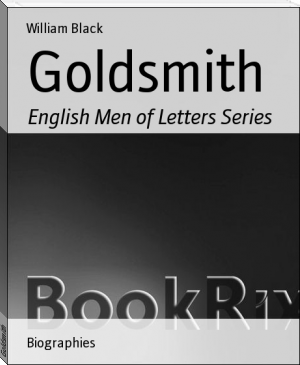Goldsmith by William Black (good books to read for beginners .TXT) 📖

- Author: William Black
Book online «Goldsmith by William Black (good books to read for beginners .TXT) 📖». Author William Black
"MR. POSTERITY,
"SIR,--Nine hundred and ninety-nine years after sight hereof
pay the bearer, or order, a thousand pounds worth of praise,
free from all deductions whatsoever, it being a commodity
that will then be very serviceable to him, and place it to
the account of, &c."
The bill is not yet due; but there can in the meantime be no harm in discounting it so far as to say that these Essays deserve very decided praise. They deal with all manner of topics, matters of fact, matters of imagination, humorous descriptions, learned criticisms; and then, whenever the entertainer thinks he is becoming dull, he suddenly tells a quaint little story and walks off amidst the laughter he knows he has produced. It is not a very ambitious or sonorous sort of literature; but it was admirably fitted for its aim--the passing of the immediate hour in an agreeable and fairly intellectual way. One can often see, no doubt, that these Essays are occasionally written in a more or less perfunctory fashion, the writer not being moved by much enthusiasm in his subject; but even then a quaint literary grace seldom fails to atone, as when, writing about the English clergy, and complaining that they do not sufficiently in their addresses stoop to mean capacities, he says--"Whatever may become of the higher orders of mankind, who are generally possessed of collateral motives to virtue, the vulgar should be particularly regarded, whose behaviour in civil life is totally hinged upon their hopes and fears. Those who constitute the basis of the great fabric of society should be particularly regarded; for in policy, as in architecture, ruin is most fatal when it begins from the bottom." There was, indeed, throughout Goldsmith's miscellaneous writing much more common sense than might have been expected from a writer who was supposed to have none.
As regards his chance criticisms on dramatic and poetical literature, these are generally found to be incisive and just; while sometimes they exhibit a wholesome disregard of mere tradition and authority. "Milton's translation of Horace's Ode to Pyrrha," he says, for example, "is universally known and generally admired, in our opinion much above its merit." If the present writer might for a moment venture into such an arena, he would express the honest belief that that translation is the very worst translation that was ever made of anything. But there is the happy rendering of _simplex munditiis_, which counts for much.
By this time Goldsmith had also written his charming ballad of _Edwin and Angelina_, which was privately "printed for the amusement of the Countess of Northumberland," and which afterwards appeared in the _Vicar of Wakefield_. It seems clear enough that this quaint and pathetic piece was suggested by an old ballad beginning,
"Gentle heardsman, tell to me,
Of curtesy I thee pray,
Unto the towne of Walsingham
Which is the right and ready way,"
which Percy had shown to Goldsmith, and which, patched up, subsequently appeared in the _Reliques_. But Goldsmith's ballad is original enough to put aside all the discussion about plagiarism which was afterwards started. In the old fragment the weeping pilgrim receives directions from the herdsman, and goes on her way, and we hear of her no more; in _Edwin and Angelina_ the forlorn and despairing maiden suddenly finds herself confronted by the long-lost lover whom she had so cruelly used. This is the dramatic touch that reveals the hand of the artist. And here again it is curious to note the care with which Goldsmith repeatedly revised his writings. The ballad originally ended with these two stanzas:--
"Here amidst sylvan bowers we'll rove,
From lawn to woodland stray;
Blest as the songsters of the grove,
And innocent as they.
"To all that want, and all that wail,
Our pity shall be given,
And when this life of love shall fail,
We'll love again in heaven."
But subsequently it must have occurred to the author that, the dramatic disclosure once made, and the lovers restored to each other, any lingering over the scene only weakened the force of the climax; hence these stanzas were judiciously excised. It may be doubted, however, whether the original version of the last couplet:
"And the last sigh that rends the heart
Shall break thy Edwin's too,"
was improved by being altered into
"The sigh that rends thy constant heart
Shall break thy Edwin's too."
Meanwhile Goldsmith had resorted to hack-work again; nothing being expected from the _Vicar of Wakefield_, now lying in Newbery's shop, for that had been paid for, and his expenses were increasing, as became his greater station. In the interval between the publication of the _Traveller_ and of the _Vicar_, he moved into better chambers in Garden Court; he hired a man-servant, he blossomed out into very fine clothes. Indeed, so effective did his first suit seem to be--the purple silk small-clothes, the scarlet roquelaure, the wig, sword, and gold-headed cane--that, as Mr. Forster says, he "amazed his friends with no less than three similar suits, not less expensive, in the next six months." Part of this display was no doubt owing to a suggestion from Reynolds that Goldsmith, having a medical degree, might just as well add the practice of a physician to his literary work, to magnify his social position. Goldsmith, always willing to please his friends, acceded; but his practice does not appear to have been either extensive or long-continued. It is said that he drew out a prescription for a certain Mrs. Sidebotham which so appalled the apothecary that he refused to make it up; and that, as the lady sided with the apothecary, he threw up the case and his profession at the same time. If it was money Goldsmith wanted, he was not likely to get it in that way; he had neither the appearance nor the manner fitted to humour the sick and transform healthy people into valetudinarians. If it was the esteem of his friends and popularity outside that circle, he was soon to acquire enough of both. On the 27th March, 1766, fifteen months after the appearance of the _Traveller_, the _Vicar of Wakefield_ was published.
CHAPTER XI.
THE VICAR OF WAKEFIELD.
The _Vicar of Wakefield_, considered structurally, follows the lines of the Book of Job. You take a good man, overwhelm him with successive misfortunes, show the pure flame of his soul burning in the midst of the darkness, and then, as the reward of his patience and fortitude and submission, restore him gradually to happiness, with even larger flocks and herds than before. The machinery by which all this is brought about is, in the _Vicar of Wakefield_, the weak part of the story. The plot is full of wild improbabilities; in fact, the expedients by which all the members of the family are brought together and made happy at the same time, are nothing short of desperate. It is quite clear, too, that the author does not know what to make of the episode of Olivia and her husband; they are allowed to drop through; we leave him playing the French horn at a relation's house; while she, in her father's home, is supposed to be unnoticed, so much are they all taken up with the rejoicings over the double wedding. It is very probable that when Goldsmith began the story he had no very definite plot concocted; and that it was only when the much-persecuted Vicar had to be restored to happiness, that he found the entanglements surrounding him, and had to make frantic efforts to break through them. But, be that as it may, it is not for the plot that people now read the _Vicar of Wakefield_; it is not the intricacies of the story that have made it the delight of the world. Surely human nature must be very much the same when this simple description of a quiet English home went straight to the heart of nations in both hemispheres.
And the wonder is that Goldsmith of all men should have produced such a perfect picture of domestic life. What had his own life been but a moving about between garret and tavern, between bachelor's lodgings and clubs? Where had he seen--unless, indeed, he looked back through the mist of years to the scenes of his childhood--all this gentle government, and wise blindness; all this affection, and consideration, and respect? There is as much human nature in the character of the Vicar alone as would have furnished any fifty of the novels of that day, or of this. Who has not been charmed by his sly and quaint humour, by his moral dignity and simple vanities, even by the little secrets he reveals to us of his paternal rule. "'Ay,' returned I, not knowing well what to think of the matter, 'heaven grant they may be both the better for it this day three months!' This was one of those observations I usually made to impress my wife with an opinion of my sagacity; for if the girls succeeded, then it was a pious wish fulfilled; but if anything unfortunate ensued, then it might be looked on as a prophecy." We know how Miss Olivia was answered, when, at her mother's prompting, she set up for being well skilled in controversy:--
"'Why, my dear, what controversy can she have read?' cried I. 'It does not occur to me that I ever put such books into her hands: you certainly overrate her merit.'--'Indeed, papa,' replied Olivia, 'she does not; I have read a great deal of controversy. I have read the disputes between Thwackum and Square; the controversy between Robinson Crusoe and Friday, the savage; and I am now employed in reading the controversy in Religious Courtship.'--'Very well,' cried I, 'that's a good girl; I find you are perfectly qualified for making converts, and so go help your mother to make the gooseberry pie.'"
It is with a great gentleness that the good man reminds his wife and daughters that, after their sudden loss of fortune, it does not become them to wear much finery. "The first Sunday, in particular, their behaviour served to mortify me. I had desired my girls the preceding night to be dressed early the next day; for I always loved to be at church a good while before the rest of the congregation. They punctually obeyed my directions; but when we were to assemble in the morning at breakfast, down came my wife and daughters, dressed out in all their former splendour; their hair plastered up with pomatum, their faces patched to taste, their trains bundled up in a heap behind, and rustling at every motion. I could not help smiling at their vanity, particularly that of my wife, from whom I expected more discretion. In this exigence, therefore, my only resource was to order my son, with an important air, to call our coach. The girls were amazed at the command; but I repeated it with more solemnity than before. 'Surely, my dear, you jest,' cried my wife; 'we can walk it perfectly well: we want no coach to carry us now.'--'You mistake, child,' returned I, 'we do want a coach; for if we walk to church in this trim, the very children in the parish will hoot after us.'--'Indeed,' replied my wife, 'I always imagined that my Charles was fond of seeing his children neat and handsome





Comments (0)